

To recover your password please fill in your email address
WASH Institute in collaboration with the Centre for Good Governance, Uttarakhand conducted a 3-day workshop to finalize the City Sanitation Action Plan (CSAP) under Swachh Bharat Mission 2.0 operational guidelines of 14 ULBs.
The main objective of this workshop was to handhold the representative from Urban Local Body, Jal
Sansthan, and Pey Jal Nigam in preparing and filling in the details of Annexure 3B for the City Sanitation Action Plan (CSAP) of their respective towns. 14 ULBs participated in the program, and were able to prepare their respective CSAPs. The training encompassed key aspects of Used water Management, SBM 2.0 guidelines, operations and management, assessment of gaps in infrastructure, finance and funding, and developing the UWM strategy for their respective towns. The key participants included executive officers and representatives from Pey Jal Nigam and Jal Sanstha. A total of 27 officials participated in this workshop.
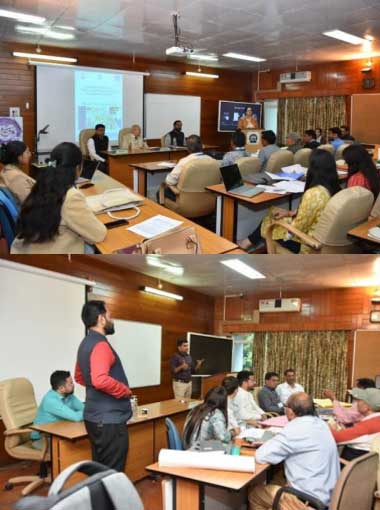
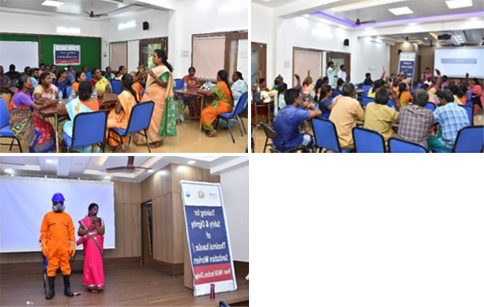
WASH Institute in collaboration with UNICEF India and Dindigul district administration, under the Swachh Bharat Mission, conducted a one-day training for Thooimai Kavalar/ Sanitation workers of the Reddiarchatram block of Dindigul district, Tamil Nadu. The training was conducted on 14th October 2023. The training aimed to train the sanitation workers on the importance of solid and liquid waste management, demonstrated the essential components of first aid, usage of personal protective equipment (PPE), and explanation of national and state schemes to ensure the safety and dignity of sanitation workers. A total of 76 participants attended the training.
WASH Institute in collaboration with SRM University, Chennai, Tamil Nadu conducted a 3-day workshop on Non-Sewered Sanitation in achieving SBM 2.0. The program was conducted between 19th–21st October 2023 at SRM University, Chennai and a total of 45 participants comprising of B.Tech Civil Engineering, M.Tech Environmental Engineering and School students attended this workshop.
The key focus areas of the training include a detailed discussion on SBM 2.0 guidelines with a focus on Fecal Sludge Management, Public health, and inclusive sanitation, DEWATS etc. A field exposure visit to the relevant Fecal Sludge Treatment Plant at Karunguzhi within the state was also arranged for the participants. This workshop aims to increase the number of skilled professionals in the Water, Sanitation and Hygiene sectors across India and enhance access to people in safely managed disposal services through FSSM.
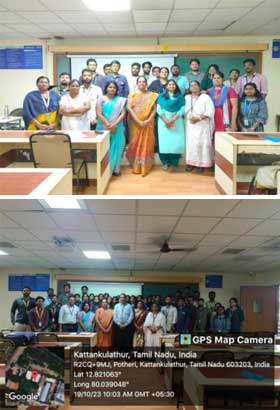
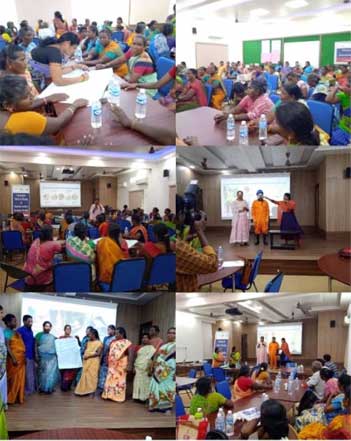
WASH Institute in collaboration with UNICEF India and Dindigul district administration, under the Swachh Bharat Mission, conducted a one-day training for Thooimai Kavalar/ Sanitation workers of the Reddiarchatram block of Dindigul district, Tamil Nadu. The training was conducted on 4th November 2023. The training aimed to train the sanitation workers on the importance of solid and liquid waste management, demonstrated the essential components of first aid, usage of personal protective equipment (PPE), and explanation of national and state schemes to ensure the safety and dignity of sanitation workers. A total of 61 participants attended the training.
WASH Institute in collaboration with Mavelikara Municipality, successfully organized a comprehensive training session for its CT/PT (Community Toilet and Public Toilet) operators. The training was conducted on the 9th November 2023.
The workshop aimed to empower operators with the knowledge and skills necessary to fulfil their roles effectively. The training comprised modules specifically designed to assist CT/PT operators in understanding their roles and responsibilities and enhance their skill sets for more efficient CT/PT operation. The CT/PT course on the WASHi Learning Management System (LMS) utilized various engaging tools, including videos, reading materials with pictures, and quizzes, fostering an effective and interactive learning experience. The active participation of ULB officials, including the Chairman, Health Standing Committee Chairman, and Health Supervisor, underscored the importance of the training. Certificates were distributed to participants upon the successful completion of the course, recognising their commitment to professional development and the enhancement of CT/PT operations.
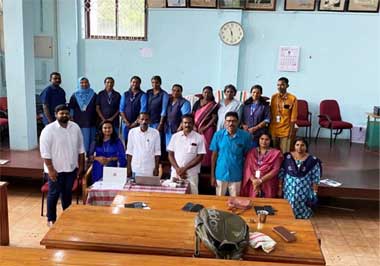
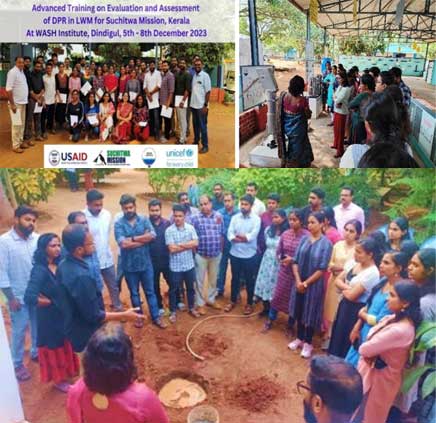
WASH Institute in collaboration with Suchitwa Mission, Kerala and UNICEF and with the support of USAID, conducted a 4-day advanced training on the preparation and evaluation of DPR in liquid waste management projects in Dindigul. The participants for the training comprised of LWM Director, District Coordinators, LWM Experts/Engineers. and Young Professionals from Suchitwa Mission, Kerala. The training commenced with an introductory session and setting the stage for the participants through an ice-breaking activity. A pre and post-test was conducted, revealing an average score of 54% and 77% respectively, indicating improvement in the baseline knowledge of the attendees. A total of 35 people participated in this training.
WASH Institute in collaboration with UNICEF India and Dindigul district administration, under the Swachh Bharat Mission, conducted a one-day training for Thooimai Kavalar/ Sanitation workers of the Reddiarchatram block of Dindigul district, Tamil Nadu. The training was conducted on 9th December 2023. The training aimed to train the sanitation workers on the importance of solid and liquid waste management, demonstrated the essential components of first aid, usage of personal protective equipment (PPE), and explanation of national and state schemes to ensure the safety and dignity of sanitation workers. A total of 61 participants attended the training.
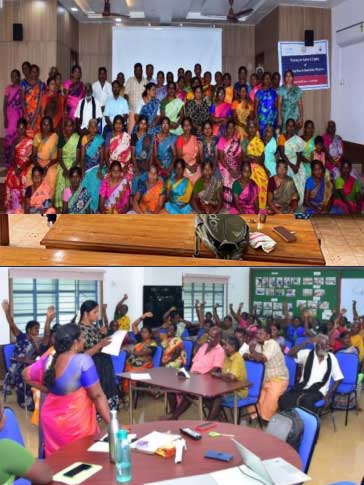
WASH Institute with the support of the USAID, in collaboration with AMRUT 2.0 Kerala and the support of USAID, achieved a significant milestone by hosting a highly successful Advanced Training on the Preparation of Detailed Project Reports (DPR) specifically tailored for Sewage and Septage Projects. This specialized training program catered to the officials of AMRUT Kerala and took place from 11th-15th December at the WASH Institute in Dindigul. The collaborative effort aimed at enhancing the knowledge and skills of the participants, contributing to the effective planning and implementation of sewage and septage projects in the region.
The training was designed with the primary objective of enriching participants' knowledge and expertise in preparing and reviewing Detailed Project Reports (DPR) for Sewage and Septage Projects, specifically focusing on Sewer networks and the implementation of Sewage Treatment Plants (STPs) and Faecal Sludge Treatment Plants (FSTPs) in AMRUT cities. The training sessions were not only informative but also practical, featuring hands-on activities such as the evaluation of DPRs, analysis of case studies, and the use of checklists for reviewing DPRs. Furthermore, participants gained valuable field experience through a practical session focused on assessing a functional STP and FSTP. This multifaceted approach aimed to equip officials from AMRUT Kerala with both theoretical knowledge and practical skills, fostering a comprehensive understanding of sewage and septage project management. A total of 29 officials participated in this training.
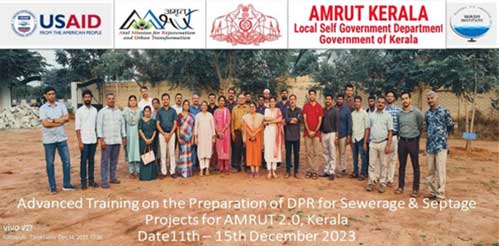
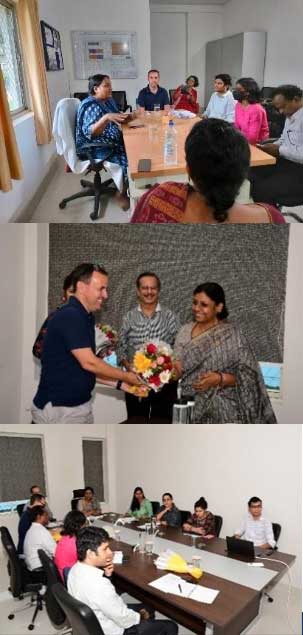
The delegates from USAID Mr. Mark Tegenfeldt (Director – General Development office), Mr Srinivasan (Project Management Specialist) and Ms. Olivia visited Bhubaneshwar to interact with frontline workers like sanitation workers from ERSU, Self Help Group managing the SeTP Basuaghai and SHGs managing solid waste management (SWM) facility at Basughai.
The visit started briefly with the intervention in the state and the journey of OUA provided by Dr. Shantanu, Director of Odisha Urban Academy (OUA). In continuation of the same, Ms. Sagarika, Special Secretary of State Housing & Urban Development Directorate, Odisha, stated that they want to saturate the capacity building program across the state for which they are looking forward to support from USAID and WASH Institute.
Post meeting the officials, the team visited Basuaghai SeTP and further interacted with the transgender SHG responsible for managing the operation and maintenance of the plant. They also visited to solid waste management facility in Basuaghai. The team also visited Mr. Prasanta Mohapatra, Engineer in Chief, of OWSSB.
WASH Institute In collaboration with the Directorate of Urban Local Bodies, Uttar Pradesh, conducted a two-day Consultative meeting with officials from UP-Jal Nigam and ULB officials on DPR preparation for UWM collaboration with the Directorate of Urban Local Bodies, Uttar Pradesh.
Under the Swachh Bharat Mission Urban, the Jal Nigam of Uttar Pradesh has developed a total of 34 Detailed project reports (DPR). These were reviewed by the Directorate and a need for further handholding of these officials was seen. The workshop aimed to have a consultative discussion with the officials on the various technical aspects and critical aspects of DPR preparation including the topographical survey, key components in DPR preparation, various technologies used for Used water management, Operational and maintenance issues, understanding the ground challenges and potential solutions for the same.
The key participants included executive engineers from Uttar Pradesh Jal Nigam, a parastatal body responsible for preparing DPR in the state and Executive officials from various Urban Local Bodies. A total of 7 officials from UP-Jal Nigam and 5 Executive officials from various ULBs attended the workshop.
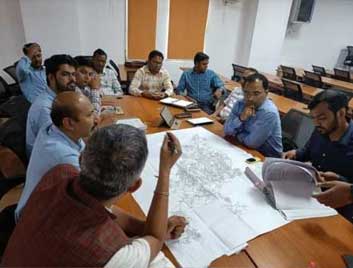
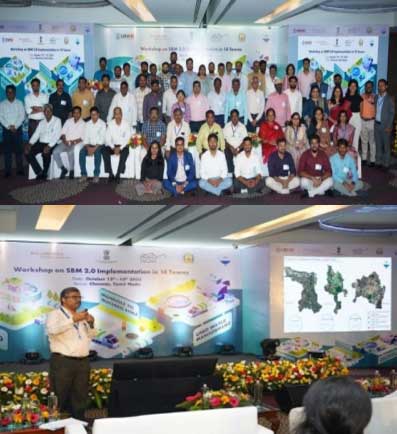
Water Sanitation and Hygiene Institute (WASH Institute) under the guidance and support of the Ministry of Housing and Urban Affairs (MoHUA) and the Government of Tamil Nadu conducted a 2-day workshop on SBM 2.0 implementation in 14 towns across 10 states. The workshop focussed on key thematic areas mainly toilet 2.0, Man-hole to Machine -hole and Used Water Management.
The purpose of the workshop was to understand the status of SBM 2.0 (U) implementation, and the significance of 14 town initiatives along with understanding the components of aspirational toilets, the scope of the Man-hole to Machine-hole, understanding the roles of stakeholders, Emergency Response Sanitation Unit, Vision and approaches for Used Water Management and curating a workplan for the SBM 2.0 implementation in the 14 towns across 10 states namely Assam, Uttar Pradesh, Jharkhand, Telangana, Tamil Nadu, Odisha, Goa, Kerala, West Bengal and Uttarakhand.
A total of 74 participants attended the workshop including 59 participants from 10 states including WASH Institute City coordinators, NFFSM Alliance members, partners and 15 WASH Institute staff.
The inaugural IWA NSS Conference 2023 took place in Johannesburg, South Africa from October 15 to 18, 2023. This unique event underscored the importance of fresh ideas and solutions in addressing sanitation challenges, both in South Africa and on a global scale. The conference marked a significant milestone in advancing our understanding of these challenges and working toward the Sustainable Development Goals (SDGs). Its overarching goals were the elimination of sanitation inequalities and the expansion of access to underserved populations through innovative solutions. Participants in the conference included diplomats, engineers, social scientists, and young professionals from around the world. Notably, the event was graced by the presence of the Minister of Local Self Government, Kerala, the Principal Director of the Local Self Department, the Mission Director of AMRUT, and the Assistant Advisor of CPHEEO.
The participants were engaged in various sessions, such as "Emptying Value Chain: Mechanizing Waste Collection to Improve Efficiency and Safety: Fresh Life’s Experience in Nairobi’s Informal Settlements," "Sanitation Journey of India and technologies involved," "Advancing Monitoring of non-sewered sanitation services for local, national and global purposes," and "E-Learning Management System (LMS) for capacity building in FSSM and UWM in India." Additionally, they had the opportunity to visit poster presentations on topics like "Green Hydrogen Production from Wastewater Electrolysis" and "Adaptation of water recirculating non-sewered sanitation systems in water-stressed countries." Additionally, the WASHi team presented two papers on different subjects and actively participated in thematic sessions throughout the conference. Ms. Anisha Dey presented on "Sanitation journey of India and technologies involved," while Ms. Chetna Singh discussed "E-Learning Management System (LMS) for capacity building in FSSM and UWM in India.".
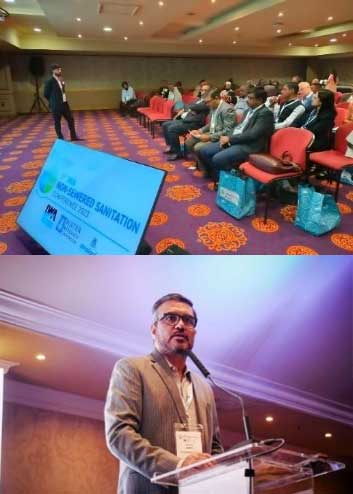
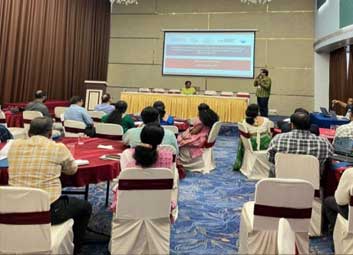
WASH Institute organized a one-day workshop with LSGD officials for the Implementation and Empanelment of Agencies for Faecal Sludge Treatment Plants in Kerala on 17th October 2023.
The workshop aimed to empanel the shortlisted agencies in the field of implementing Faecal Sludge Treatment Plants. During the workshop participants presented their scope of work in implementing FSTPs in Kerala in the presence of Technical Committee Members. Also, the Guidelines for FSTP Implementation and Methods of Implementation have been discussed and suggestions from participants and the technical committee were taken. A total of 58 participants attended the training.
WASH Institute, with the support of USAID, in collaboration with Toilet Board Coalition (TBC) has developed an online training module for CT-PT operators in Malayalam. This module was launched officially on 4th November 2023 in the presence of Executive Director Suchitwa Mission Shri. K T Balabhaskaran. This module will be promoted by Suchitwa Mission (Government of Kerala) for ULBs to train their CT/PT operators, throughout the state.
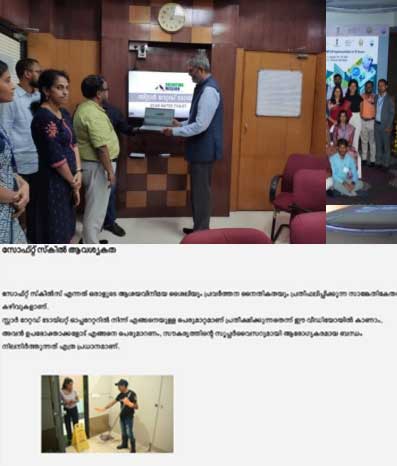
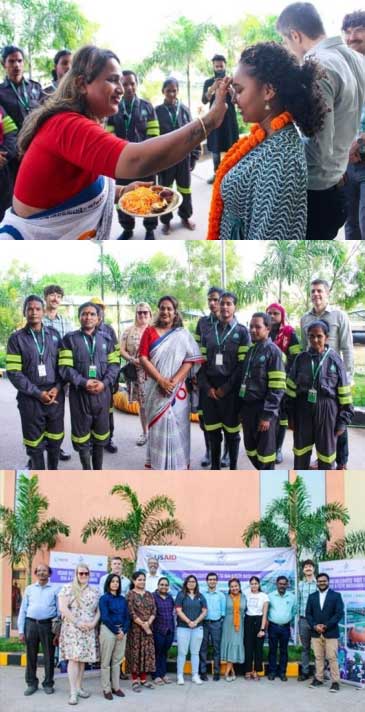
WASH Institute in collaboration with the Odisha Water Supply & Sewerage Board (OWSSB), Water Corporation of Odisha (WATCO) and Odisha Urban Academy (OUA), organised the visit of USAID delegates to Odisha Urban Academy (OUA) and the Basuaghai Faecal Sludge treatment plant in Bhubaneswar, Odisha on the 8 November 2023.
The delegates, Kathryn Booker-Veloz (Senior Diversity, Equity, Inclusion, and Accessibility (DEIA) Advisor),Aaron Schubert (Deputy Director, Indo-Pacific Office), Martha Van Lieshout (Development, Outreach and Communications Officer), Brian Holler (Division Chief - Health Communications, Operations, Research, and Evaluation) and Olivia Francis (Project Management Assistant) visited to understand the state government model of engaging transgender communities as operators of government utilities and explore issues faced by sanitation workers in maintaining sewer lines and septic tanks. The impact of WASH Institute’s Emergency Response Sanitation Unit (ERSU) training for sanitation workers was also a key point of interest.
Kathryn Booker-Veloz interacted with the transgender community operating the plant and sanitation workers, delving into their journey, challenges, and aspirations. The visit acknowledged the potential of the young technical resource persons and appreciated the effort of those involved in the initiative. They appreciated the state's launch of the Garima Scheme and ERSU training. Mr. Shantanu Rath, Director of Odisha OUA, and his team and the representatives from WASH Institute were present to facilitate the visit.
Water Sanitation and Hygiene Institute (WASH Institute) with the support of USAID and under the guidance of the Ministry of Housing and Urban Affairs (MoHUA) and the government of Tamil Nadu conducted a 2-day workshop at Le Royal Meridien in Chennai, Tamil Nadu. The workshop was inaugurated by, Roopa Mishra (JS SBM-U), Dr. J.Radhakrishnan (Commissioner, GCC, GoTN), D Kartikeyan (Principal Secretary, GoTN) and Dr Madu Rani Teotia (Director SBM-Urban).
The workshop entailed experts and officials addressing critical aspects of sanitation infrastructure and management. Discussions covered financing, ideal toilet models, sanitation principles, and innovative approaches. Sessions delved into private sector expectations, sanitation worker safety, operational schemes, and mechanised cleaning experiences across cities. Other sessions covered diverse topics including ideal CT-PT models, Tamil Nadu's response to toilet services during adversities, principles to approach sanitation, operationalizing toilets without fees, SHG involvement in maintenance, survey insights, innovative aspirational toilet models, app-based monitoring, toilet construction technologies, and more. Overall, the workshop emphasized partnerships, innovation, sustainable operations, and sanitation worker welfare as crucial elements in creating a comprehensive and effective sanitation ecosystem. More than 250 participants attended this workshop from 27 states and 6 union territories in this workshop.
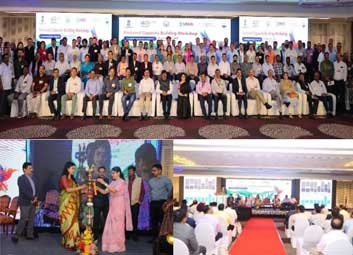
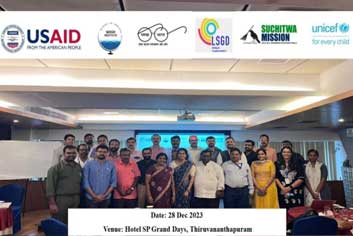
The WASH Institute with the support of USAID and in collaboration with Suchitwa Mission Kerala, recently accomplished a significant milestone through the successful organization of a one-day State Level Consultative workshop focused on Grey Water Management Projects. This specialized workshop, held on 28th December 2023 at the SP Grand Days in Trivandrum, Kerala, specifically targeted officials from Suchitwa Mission Kerala. The collaborative initiative aimed at bolstering the knowledge and skills of participants, thereby facilitating more effective planning and implementation of Grey Water Management projects within the region.
The training was strategically crafted to achieve its primary objective of enhancing participants' proficiency in identifying and formulating Grey Water Management Plans at the District level, with a particular emphasis on selecting appropriate technologies based on specific requirements. The comprehensive curriculum covered diverse aspects, ranging from discussions on Grey Water Management approaches to engaging case study presentations. Expert presentations added depth to the program by illuminating critical aspects of GWM, including planning and an overview of treatment technologies. This training went beyond traditional approaches, incorporating hands-on activities that facilitated a dynamic exchange of ideas and addressed challenges unique to the Grey Water Management domain in Kerala. Overall, the workshop served as a valuable platform for knowledge enrichment and skill enhancement, ultimately contributing to the advancement of effective Grey Water Management projects in the region.
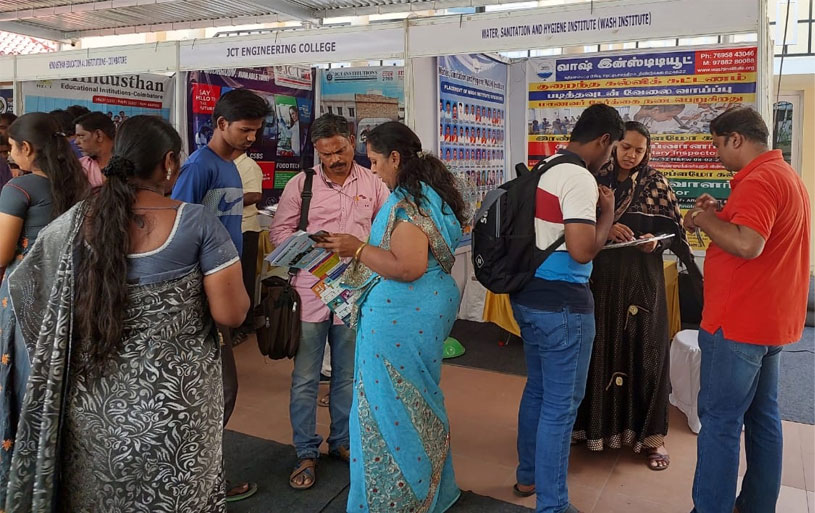
WASH Institute has participated in two days Dinamalar Vazhikatti Educational Expo organised by Dinamalar Newspaper at PVK Mahal in Dindigul during 15-16 April, 2023.This expo helped to showcase the various courses conducted at WASH Institute such as Post Graduate Diploma in Water and Waste Water Quality Management and Post Graduate Diploma in Non Sewered Sanitation to the common public and students. Moreover, WASH Institute faculty distributed flyers that contains details about our courses to all the participants. We briefed them about the eligibility for the courses, the facilities, and trainings provided to the students, various employment opportunities relevant to the courses etc. This expo overall provided the greatest opportunity in creating awareness among the public about the courses, trainings provided, placement opportunities etc. This expo was a step forward to improve the admission numbers for the courses.
WASH Institute with the support of the Government of Odisha facilitated the visit of Ms. Veena Reddy, Mission Director, USAID India in Cuttack on April 27, 2023. Ms. Reddy visited the Septage Treatment Plant (SeTP) and Water Treatment Plant (WTP) to interact with the Self-Help Group (SHG), sanitation workers, and government officials. Shri Subhash Singh, Mayor Cuttack; Ms. Additional Commissioner Cuttack, Ms. Suryabarti Majhi, Deputy Project Engineer from Odisha Water Supply Sewerage Board (OWSSB) were also present on the occasion. Ms. Reddy interacted with the transgender Bahuchar Mata Self Help Group (SHG) to learn how they get the opportunity, their role, and the impact they feel after joining the program. She also interacted with sanitation workers to understand the benefits they have received from the Garima scheme and how their lives have been impacted through the scheme. She recognized the state government's efforts in creating the community-led approach. Members of the post-interaction group show them around the SeTP sites and help her understand its functioning.
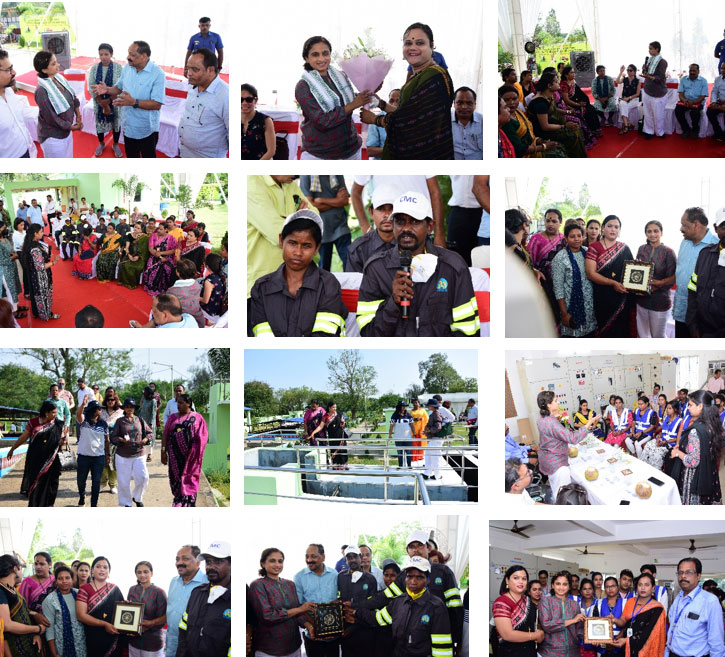
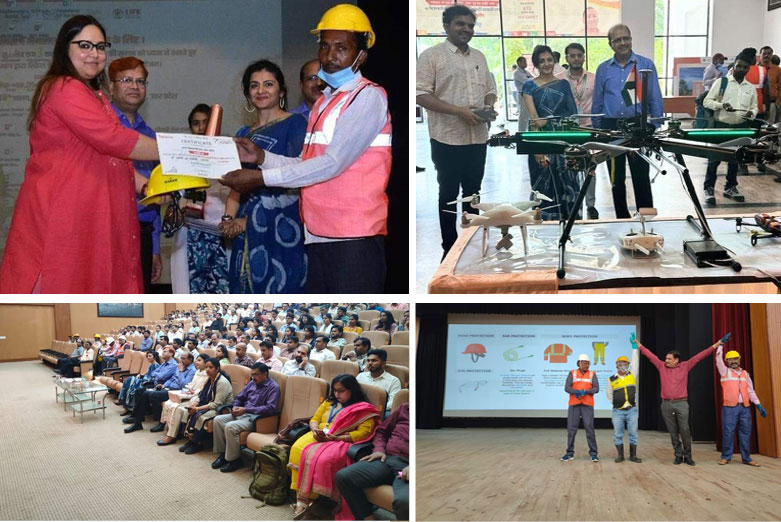
One day training of safai karmis (people engaged in sewer and septic tank cleaning) on the processes and challenges in sewer/ septic tank cleaning & repairs, and solutions to the current challenges including current regulations/ guidelines/ standard operating procedures & government schemes for rights of sanitation workers, was held during 19 May, 2023 at Lucknow. WASH Institute provided a training on technical content and capacity building for resource persons. A total of 200 participants including Safai Mitras, City Health Officers, Chief Medical Officers, Executive Engineers, Assistant Engineers and Sanitary Inspectors attended the training. During the training, the directorate also felicitated seven safaimitras for their work performance.
The Technology Innovation Foundation of IIT Palakkad team comprising Anuradha Shankar – CEO, Praveen G – Project Manager (GSCOE), and Jude Arul Kumar – Training Officer, visited the WASH Academy campus in Dindigul on 06 June, 2023. The purpose of this visit was to interact with WASH Institute’s staff and discuss collaboration between WASH Institute and IIT Palakkad with respect to trainings and other action points. Upon reaching the campus, they were shown and explained about the facilities at the campus such as the sanitation park, and ERSU model which included a demonstration of Mobile Septage Treatment Unit (MTU). Post the demonstration of the visit, action points were discussed for collaboration between the two teams. As part of this visit, the delegates also planted tree saplings at the campus, with their name boards displayed next to the saplings.
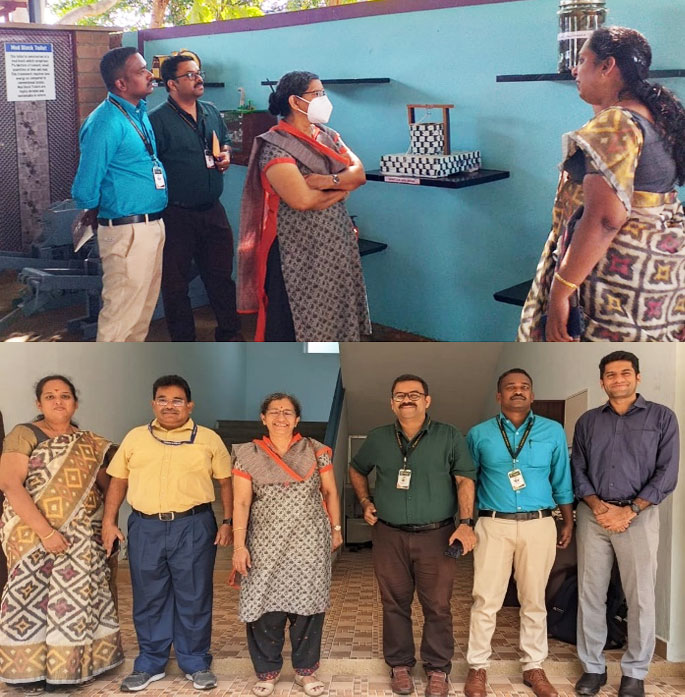
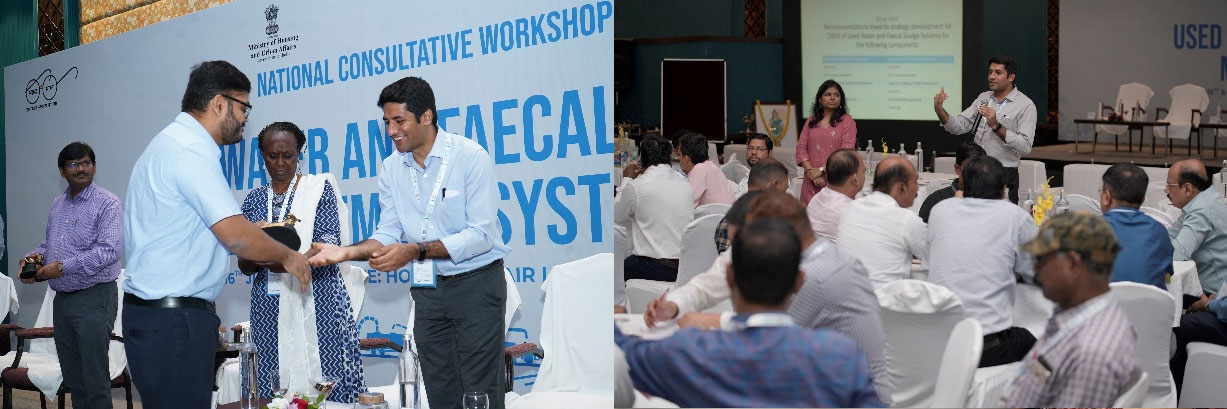
WASH Institute participated in the two-day national workshop on FSM and used water management held at Raipur, Chhattisgarh during 15-16 June, 2023. WASH institute presented the skill development of STPs and FSTPs operators towards operations & maintenance of the treatment infrastructure. Over 95 Govt. officials from 21 states participated in the event. An exhibition of technology options for FSM and used water management was inaugurated by Sh. Shiv Kumar Dahariya, Hon. State Minister Urban Development, Govt of Chhattisgarh. WASH Institute also exhibited MTU (Mobile Treatment Unit) technology in the event, where the participants were keen on implementing this technology in their states.
Suchitwa Mission, Government of Kerala organized a consultative workshop on liquid waste management from 26th-27th June 2023, at the Suchitwa Mission Conference Hall located in the Annexe Office, Trivandrum. WASH Institute staff attended this workshop to discuss and understand on the training needs of the ULBs on liquid waste management across the State. A total of around 12 participants attended this workshop, which included WASH Institute and Suchitwa Mission staff and ULB engineers, respectively. Based on the points discussed during this workshop, a training calendar and plan will be strategized and implemented in the State, with respect to capacity building of the government officials.
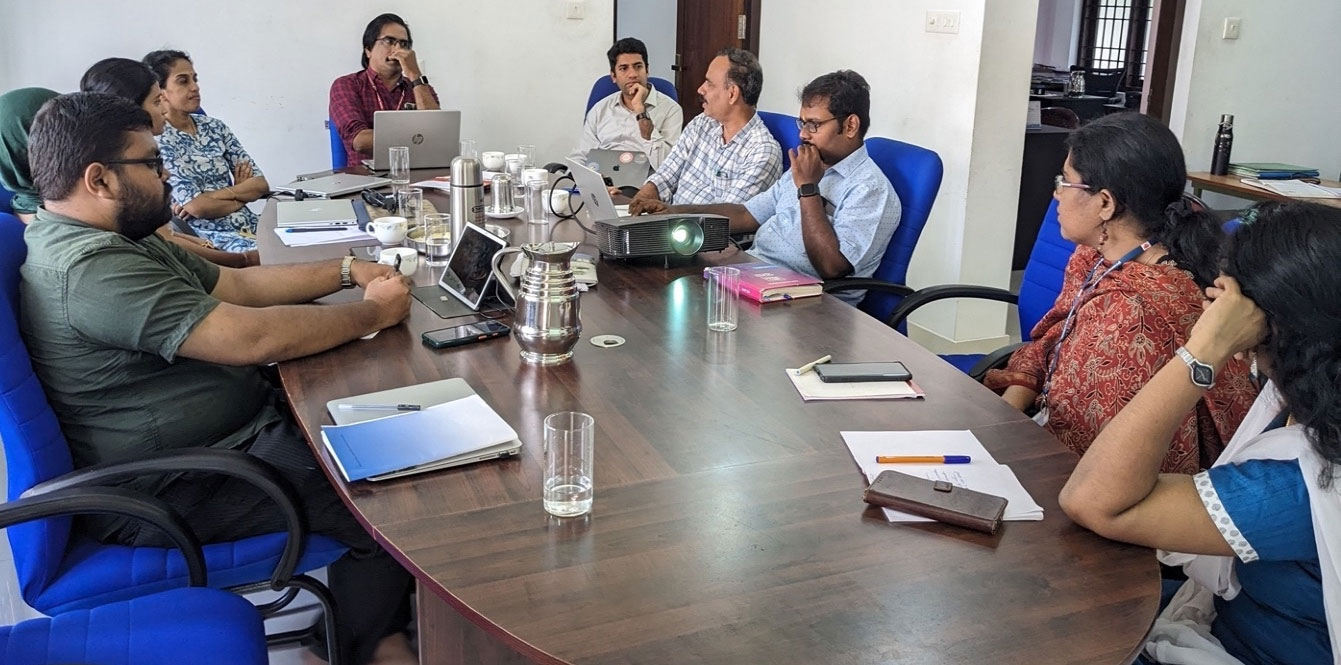
Dr. Akanksha Verma’s (Training Coordinator-Capacity Building, WASH Institute) paper on “E-Learning Management System (LMS) for capacity building in FSSM and UWM in India” got selected for the 1st IWA Non-Sewered Sanitation Conference 2023, which will be held on 15th - 18th October 2023, in Johannesburg. This paper explores the rising skill and capacity gap among stakeholders and the need for innovative initiatives which would cater to their knowledge enhancement. To bridge the knowledge gap, WASH Institute in collaboration with USAID conducted a series of capacity-building trainings in FSSM/ UWM across India on the LMS platform. The purpose of this platform is to deliver effective content and facilitate long-term engagement with the participants. This paper exhibits the importance of e-learning platforms in the post-covid era, a conscious and environment-friendly approach to knowledge acquisition.
With support from UNICEF, WASH Institute organized an exposure visit to Devanahalli FSTP for the District Panchayat President, elected representatives from the Kasaragod district in Kerala, State team of Suchitwa Mission. The visit was organized for two days, 21-22 October 2022, and the participants also visited the DEWATS system at the CDD campus to learn about the operation and maintenance of FSTP. This visit will be a milestone in constructing rural FSTPs in Kerala. More such visits will also be planned for the participants from other districts. A total of 30 participants attended this event. This exposure visit was planned and conceptualized under the USAID skill development program.
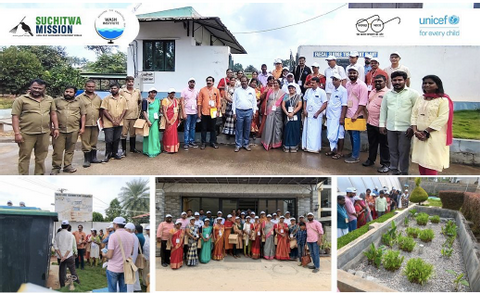
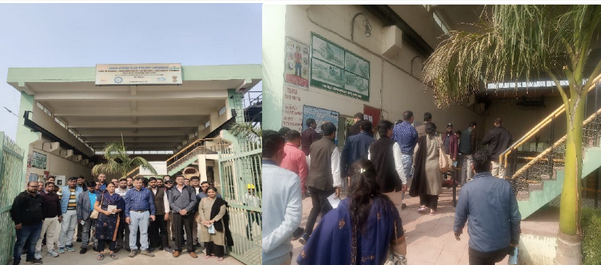
WASH Institute in collaboration with RCUES Lucknow, organized an exposure visit in two batches for the engineers from UP Jal Nigam and EOs from various ULBs of Uttar Pradesh. The first batch consisted of 22 participants. The overall objective of this exposure visit was to exchange ideas and experience regarding challenges in implementation of Sewage Treatment and infrastructure development related to STPs such as Interception and Diversion, Faecal Sludge Management services at town/city-scale, and potential of decentralized management facilities for human waste for small ULBs. The officials observed the operations of the Deenapur STP, I&D structure at Assi Main Sewage Pumping Station, and Chunar FSTP (10 KLD) during their visit.
WASH Institute in collaboration with RCUES Lucknow, organized an exposure visit in two batches for the engineers from UP Jal Nigam and EOs from various ULBs of Uttar Pradesh. The second batch consisted of 30 participants. The overall objective of this exposure visit was to exchange ideas and experience regarding challenges in implementation of Sewage Treatment and infrastructure development related to STPs such as Interception and Diversion, Faecal Sludge Management services at town/city-scale, and potential of decentralized management facilities for human waste for small ULBs. The officials observed the operations of the Deenapur STP, I&D structure at Assi Main Sewage Pumping Station, and Chunar FSTP (10 KLD) during their visit.

WASH Institute executed an agreement with Additional Skill Acquisition Programme (ASAP) on 10 October, 2022 to roll out the ‘Wastewater Treatment Plant Technician’ (NSQF level-4) course at the Community Skill Park (CSP) in Pandikkad. The 200-hour duration course has been curated to enable trainees to operate, monitor, and maintain the work safety of wastewater treatment plants, thus, making them employable. It will be offered to students who have cleared 12th standard or ITI, by a training partner appointed by ASAP Kerala, and with funding support from WASH Institute.
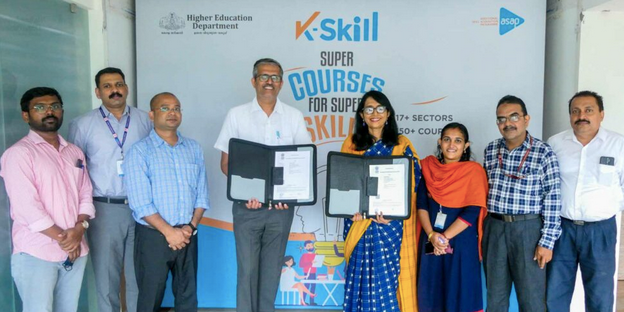
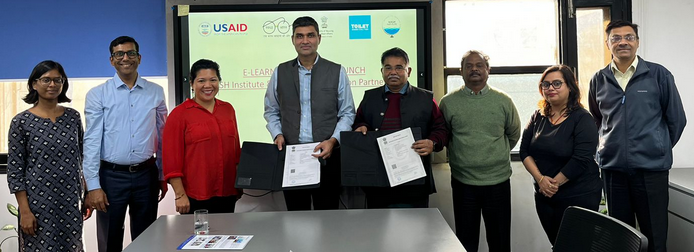
WASH Institute signed a Memorandum of Understanding (MoU) with Toilet Board Coalition (TBC), New Delhi on 13 December, 2022. This collaboration is made to develop e-learning modules for Training and Certification of sanitation workers, and capacity building of key stakeholders in water and sanitation sector.
 WASH Institute Students Recruited by the Government! Greater Chennai Corporation recruited 35 students as Health Inspector/Sanitary Inspectors and the Block Primary Health Centers recruited 38 students as Health Inspectors in various districts of Tamil Nadu
WASH Institute Students Recruited by the Government! Greater Chennai Corporation recruited 35 students as Health Inspector/Sanitary Inspectors and the Block Primary Health Centers recruited 38 students as Health Inspectors in various districts of Tamil Nadu